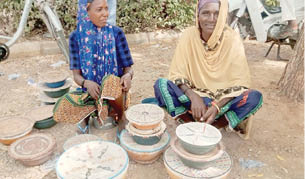Fura da nono is a staple traditional delicacy in Jigawa State and other parts of northern Nigeria and West Africa, particularly among Fulani and Hausa communities.
This nutritious and refreshing drink is made from millet dough balls served with a side of soured milk, providing a boost of carbohydrate and fiber.
Preparation of fura da nono is labour-intensive as it involves several steps, including pounding and fermenting the dough.
Despite the effort required, this traditional delicacy remains a beloved local culture and cuisine.
- Makafin Dala: Inside story of community of visually impaired persons
- Inside Nasarawa ‘dreadful’ mining camps
Fura da nono is not only a source of nourishment but also a symbol of hospitality and community life. It is often served to guests as a sign of respect and welcome, highlighting the importance of tradition and cultural heritage in Jigawa State.
However, because of inflation and the general rising cost of living in Nigeria, many are now deprived of this staple delicacy as they can no longer afford it.
Hadiza Idris, a Fulani young woman who sells fura da nono in Dutse, the Jigawa State capital, said the business was not moving like before, and it is not always readily available because of cost.
She said the price of an average calabash (kwarya) of nono was N500 last year but now costs between N1,000 and N1,500.
She called on the government to address the current economic hardship in the country.
Another Fulani woman, Dahare Shehu, who also sells fura da nono in Dutse, said the price had more than doubled.
She said she was just struggling to remain afloat in the business as everything is costly.
Dahare said if the government could help the people and make things cheap, Nigerians would be very happy and the country would be better.
Fura is a thin, sweet porridge made from millet or sorghum flour, often served with a variety of toppings, such as milk, sugar or nuts. It became a staple food among Fulani nomads, who valued its ease of preparation and nutritional value.
Nono is a fermented milk drink, similar to yogurt and made from the milk of cow, goat or sheep.
Its history can be traced to the 15th century when Fulani nomads introduced their expertise in dairy farming and processing to the region.
Nono became an integral part of the local cuisine, often consumed with fura or as a refreshing drink on its own.
Traditionally, fura and nono were prepared and sold by Fulani women, who played a significant role in preserving and passing down the recipes and techniques through generations.
Abdu Abdulhalid, a labourer in Dutse metropolis, said that before now, he used to buy a calabash of cow milk at the rate of N500, but he now coughs out up to N2,000 for the same quantity.
He called on the government to look into the situation, which he said was making people agitated.
Abdullahi Salisu, also a labourer, said the removal of fuel subsidy was the root cause of all the problems, especially the rising cost of living, which has affected fura da nono.
According to him, the price of the commodity is beyond the common man in Nigeria. “We are pleading with the government to address this situation,” Salisu said.
Another Dutse resident, Shuaib Iliyasu, said that with N500 he could buy enough fura da nono to his satisfaction, but now, even N1,500 can hardly satisfy him. He said that cost of living was making life very difficult for Nigerians, and called on the government to intervene.

 Join Daily Trust WhatsApp Community For Quick Access To News and Happenings Around You.
Join Daily Trust WhatsApp Community For Quick Access To News and Happenings Around You.

